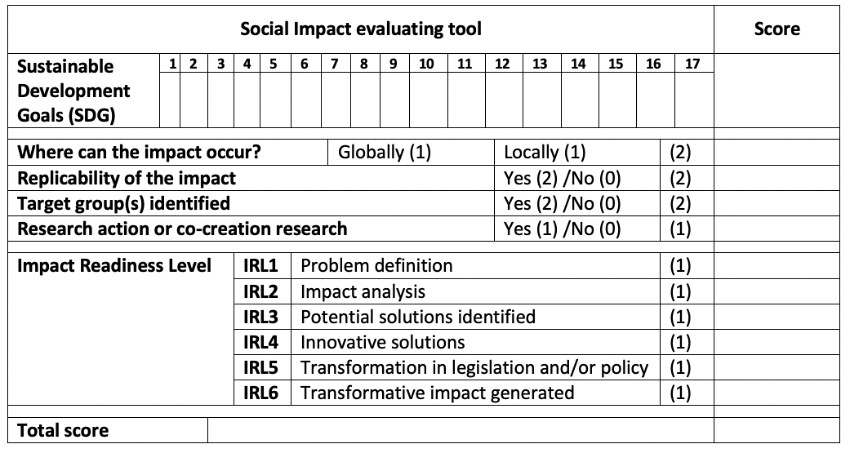Criteria for measuring social impact
InpAkta is a scientific journal that will collect evidence-based research papers in English and Basque, while seeking to contribute to the challenges of our territory and work on issues that have a social impact. In the case of local impacts, it will be assessed whether the research will identifies the contextual factors that have determined the impact, in order to facilitate the replicability of the social impact of the research. Research with universal impact will also be considered.
The social impact of the research works collected in the journal could occur in two moments:
– In the research process itself: research works that demonstrate that the contribution or transformation to the challenges of the territory is given in the research process. Research developed from the participation of the agents or with similar approaches to the research action are those that allow the impact on the research process itself.
– After the research process: research papers with potential impact or with post-research impact. In either case, the authors should refer to this potential or to the impact already experienced in the Cover Letter sent to the Editor.
It assumes that the research works, if they have a social impact, do or have social, cultural, environmental or economic potential to address the challenges of our territory. The following are examples of specific contributions[1]:
Social contribution
– Initiatives that increase people’s quality of life or reduce inequalities. E.g. New products or knowledge that allow them to solve a challenge that addresses treatments for diseases, situations of poverty or measures to prevent social exclusion and gender violence, initiatives to promote peace and coexistence, quality of life or social inequalities.
– Initiatives to contribute to the development of people’s capabilities. E.g. Innovating, improving or making training offerings more accessible, using research work in training, new approaches to training that contribute to people’s well-being, etc.
– Contribution to social policies for sustainable territorial development. E.g. Creation of new public services, political/legislative/regulatory transformations, co-creation processes with policymakers, democratization processes of policies.
– Research works based on social and citizen participation processes.
Environmental Contribution
– Products, services, projects, knowledge with environmental benefits.
– Studies related to the exploitation of natural resources and/or emissions to the atmosphere, air, land and water. E.g. Study of the environmental situation of a territory; food and biomass production; dumping and waste solutions in the marine environment, etc.
– Studies that favor the energy transition. E.g. Studies to improve the functioning of energy markets, results of energy efficiency projects, measures to improve mobility, etc.
– Contribution to environmental policies for sustainable territorial development. E.g. Creation of new public services, knowledge that can generate beneficial transformations in policies/legislation/regulations, co-creation processes with policymakers, or policy democratization processes.
Cultural contribution
– Contribution to Basque culture and Basque language. E.g. Innovative projects, development of less developed disciplines in Basque culture, dissemination measures to the diaspora, ideas and strategies for the protection, dynamization and promotion of cultural heritage.
– Contribution to cultural policies for sustainable territorial development. E.g. Creation of new public services, political/legislative/regulatory transformations, co-creation processes with policymakers, democratization processes.
Economic contribution
– Projects and/or knowledge that enable the creation of quality employment and/or labor insertion of vulnerable groups and/or long-term unemployment.
– Improve the activity of companies by deepening ESG (Environmental, Social and Governance) practices, focusing on the most vulnerable companies or combining economic growth with environmental and social sustainability.
– Studies that promote the circular economy. E.g. industrial symbiosis or recycling process studies.
– Initiatives to promote the social and solidarity economy.
– Research and technological innovation ecosystems and studies for taxation that enable sustainable development.
– Contribution to economic policies for sustainable territorial development. E.g. Creation of new public services, political/legislative/regulatory transformations, co-creation processes with policymakers, democratization processes, etc.
We have also created an agile tool to evaluate and quantify the social impact of the research works received, providing a score that allows to prioritize some of them in case of need. An unfilled tool and example are shown on next. This is a tool that will be used in the review process.

